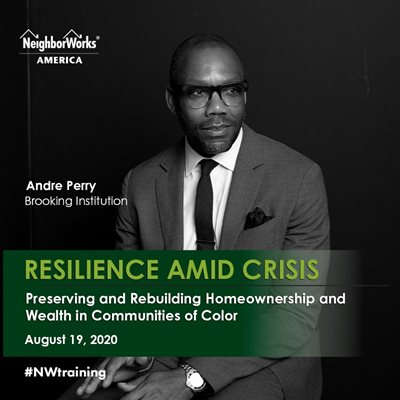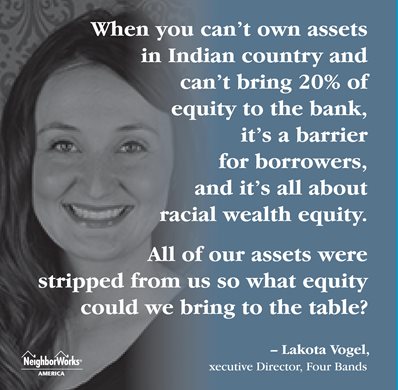"There's nothing wrong with Black people that ending racism can't solve," says Andre Perry, a fellow at Brookings Metropolitan Policy Program where he studies Black majority cities. Perry, author of "Know Your Price: Valuing Black Lives and Property in America's Black Cities," shared his research during a NeighborWorks America symposium offered in conjunction with the organization's inaugural Virtual Training Institute.
Perry says he's compared communities that had similar style homes and similar amenities. The results showed that homes in Black communities are valued at $48,000 less than in white communities.
"As the percent of Black people increases, the price of the home decreases," Perry says. "A lot of people will say that's because of education. That's because of crime. But those are things we can control for in a study."
 All those $48,000 devaluations combine to create billions of dollars in loss, Perry says: Loss that could have launched 4.4 million Black-owned businesses or paid for 8.1 million four-year degrees. "It would replace the pipes in flint Michigan nearly 3,000 times." On top of that, fewer Blacks own their homes – 40% according to NeighborWorks' newest National Housing & Financial Capability Survey, compared to 60% of the general population.
All those $48,000 devaluations combine to create billions of dollars in loss, Perry says: Loss that could have launched 4.4 million Black-owned businesses or paid for 8.1 million four-year degrees. "It would replace the pipes in flint Michigan nearly 3,000 times." On top of that, fewer Blacks own their homes – 40% according to NeighborWorks' newest National Housing & Financial Capability Survey, compared to 60% of the general population.
Perry's research also took him to Yelp!, where he analyzed reviews across the country, comparing businesses in Black neighborhoods to businesses in white neighborhoods, again with controls to find similar neighborhood conditions. He found that businesses owned by people of color rated as highly or higher than white-owned businesses on average. But they received fewer reviews. It wasn't because of the quality, he says. "It's simply because people are avoiding Black neighborhoods. There's a saying you hear all the time in Black neighborhoods, particularly from our elders. They say, 'Our ice is just as cold.'"
Yet again and again, there are discrepancies. When the federal government offered payroll protections during COVID, for instance, few Black-owned businesses received them. Perry says the devaluation of people is the reason homes are devalued. "The assets in Black communities aren't broken," he says. "They're priced lower."
One way to counter devaluation? "You invest in people," Perry says. "Direct capital toward minority-owned firms. Remove bureaucratic barriers. If you invest in inanimate objects, not people, you create conditions for gentrification. You have to invest in people more than you invest in place."
Following his keynote, he opened his discussion to a panel of leaders at Community Development Financial Institutions. CDFIs often play the role of banks (particularly in rural areas with persistent poverty) – missing from many communities of color, Perry says. But there aren't enough of them.
 Lakota Vogel, executive director of Four Bands Community Fund, agrees with Perry on valuing and understanding individuals. "We value them at what they're worth, not what America is telling them they're worth," she says. "That's the strength of a CDFI."
Lakota Vogel, executive director of Four Bands Community Fund, agrees with Perry on valuing and understanding individuals. "We value them at what they're worth, not what America is telling them they're worth," she says. "That's the strength of a CDFI."
With traditional banking, there are more barriers, she says. "When you can't own assets in Indian country and can't bring 20% equity to the bank, it's a barrier for borrowers, and it's all about racial wealth equity. All of our assets were stripped from us so what equity could we bring to the table?"
"Too often, we rely on the traditional banking system to do what they've never done adequately: Respect and invest in communities of color," says Bill Bynum, executive director of Hope Enterprise, a NeighborWorks organization in Jackson, Mississippi. "When you do not have systems to respect and invest in Black communities, those communities don't have the tools they need to climb the economic ladder."
"We have a gap down here," says Myra Martinez, deputy executive director of Affordable Homes of South Texas Inc. She says that as a CDFI, they can develop loan programs to address special issues. As individuals in the community, they can understand applicants who may not have a good credit score but who are still worth the financial risk. "We can get them into home ownership and start creating that wealth."
The pandemic has caused them all to think outside the box, Martinez says, and there's going to be more of that. The panel also discussed other things that need to change, including loan products.
"You can't address the products if you don't address policy first," Vogel says. She says racial bias is in the air that we breathe. "We can't leave it to 'hoping for the best' anymore."
Bynum agrees, adding that the wealth gap is widening. "We need to make sure policies are equitable," instead of favoring whites.
Martinez says that if CDFIs can scale up, "we can make an impact and put [dollars] in the communities that need it, that haven't been served like they should have been."
"We've got to demand that these solutions occur," Perry says. "It's not a coincidence why policy has worked for white people and not for Black people. We have to demand that policy works for us."
08/22/2020

